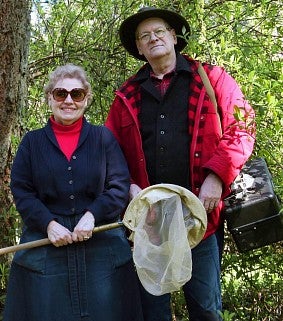William Bradshaw and Christina Holzapfel of the UO's Institute of Ecology and Evolution long ago grasped the idea that pitcher-plant mosquitoes provided a window to study how genetics are influenced by the changing world around us.
Now with a two-year award from the National Science Foundation, they will create a template — a book and accompanying materials — to help early career scientists strategically choose model organisms and create conceptual frameworks for pursuing cutting-edge research.
The award comes from the Division of Environmental Biology's Opportunities for Promoting Understanding through Synthesis program, or OPUS. It begins Sept. 15. OPUS awards go to previously supported NSF scientists to synthesize their long-term projects into a product that stimulates other researchers.

Since then, Bradshaw and Holzapfel were encouraged to create a template through the OPUS program for the development of novel and flexible research systems to resolve questions at the leading edge of science over decades-long time scales.
The book — their primary product under the award — will demonstrate how knowing a specific organism well is the key to developing the backbone for discovery and transformational research as new challenges emerge over time. Combined results from biogeography, seasonal timing, physiology, population biology, evolutionary genetics and genomics will be woven into each chapter.
An on-line video describing pattern and process in both natural field and controlled laboratory environments also will be included in the project.
Bradshaw and Holzapfel began studying their unique mosquito-carnivorous pitcher-plant system more than 40 years ago while they were postdoctoral fellows at Harvard University. The observation that a mosquito can complete its entire development within a water-filled leaf of an otherwise flesh-eating plant led them to asking and answering immediate applied questions.
Among their discoveries has been the first demonstration that climate changes can penetrate to the level of the gene, and that the mosquitoes' adaptation to changes in day length is a more important determinant of fitness than is adaptation to temperature over the time-scale of rapid climate change.
Their current work uses tools of molecular genetics and genomics to probe mosquito-borne diseases as they seek the actual genes responsible for blood feeding. Their research, they say, is based on a simple observation: "If there is no bite, there is no transmission of disease,” including malaria, yellow fever, dengue, West Nile virus and a multitude of encephalitis viruses.
—By Jim Barlow, Public Affairs Communications

